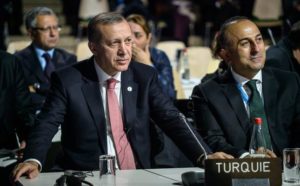by WorldTribune Staff, August 3, 2016
Germany’s vice chancellor said the EU “will not be blackmailed” after Turkey threatened to walk away from its agreement to reduce the flow of migrants into Europe.
Turkish Foreign Minister Mevlut Cavusoglu said Ankara would bail on the agreement if it does not receive visa-free travel for Turks in return.

Cavusoglu’s threat came after Germany joined other countries urging the government of Turkish President Recep Tayyip Erdogan to show restraint in response to the July 15 coup attempt. In the wake of the coup, Turkey has arrested thousands of people, shut down media outlets and fired thousands of public sector workers.
German Vice Chancellor Sigmar Gabriel said “it is up to Turkey if there is or there isn’t visa liberalization. Germany and Europe should under no circumstances be blackmailed.”
Under the agreement reached in March, asylum seekers arriving clandestinely in Greece are detained and returned to Turkey if their applications fail – a move that has seen crossings over the Aegean Sea drop dramatically.
The EU demands that Turkey fulfill a list of criteria including amending its anti-terrorism laws so they cannot be used to target academics, journalists and political dissenters.
Erdogan has accused the EU of reneging on promises made during the deal.
“We are the ones who are protecting the European Union by sheltering 3 million Syrians and Iraqis,” he said on Aug. 2. “They still haven’t brought about their promises. They promised 3 billion euros, this money still hasn’t arrived.
“The visa issue still hasn’t been brought about. But they expect us to meet (our) obligations. I am sorry but these steps will be taken simultaneously. You cannot demand the refugee return agreement without fulfilling your obligations. Sorry, but we are not a country that you can boss about.”
Meanwhile, tensions between Germany and Turkey escalated on Aug. 1 when Ankara summoned a German diplomat in protest of a court decision that prevented Erdogan from addressing thousands of his supporters via video link at a weekend demonstration in Germany.
The July 31 rally in the German city of Cologne was held to denounce the failed coup in Turkey and organizers wanted Erdogan to speak to the crowd from a video screen.
Hours before the demonstration began, Germany’s highest court upheld a regional court ruling that banned all live broadcasts at the rally apart from events happening on the main stage.
Cologne police requested the ban, fearing that speeches by Erdogan or other Turkish politicians might inflame what they called an already “very emotional situation” that might have “boiled over.” An estimated 30,000 to 40,000 people attended the rally.
About 3 million people with Turkish roots live in Germany.
Turkish Deputy Prime Minister Numan Kurtulmus on Aug. 1 accused Germany of hypocrisy. He said German courts normally address cases very slowly, “yet the German Constitutional Court prohibited our president addressing the rally via teleconference in less than 24 hours. This is a clear double standard.”
Germany’s Gabriel disputed that claim, saying the “decision not to allow the broadcast was absolutely OK and also lawful.”
